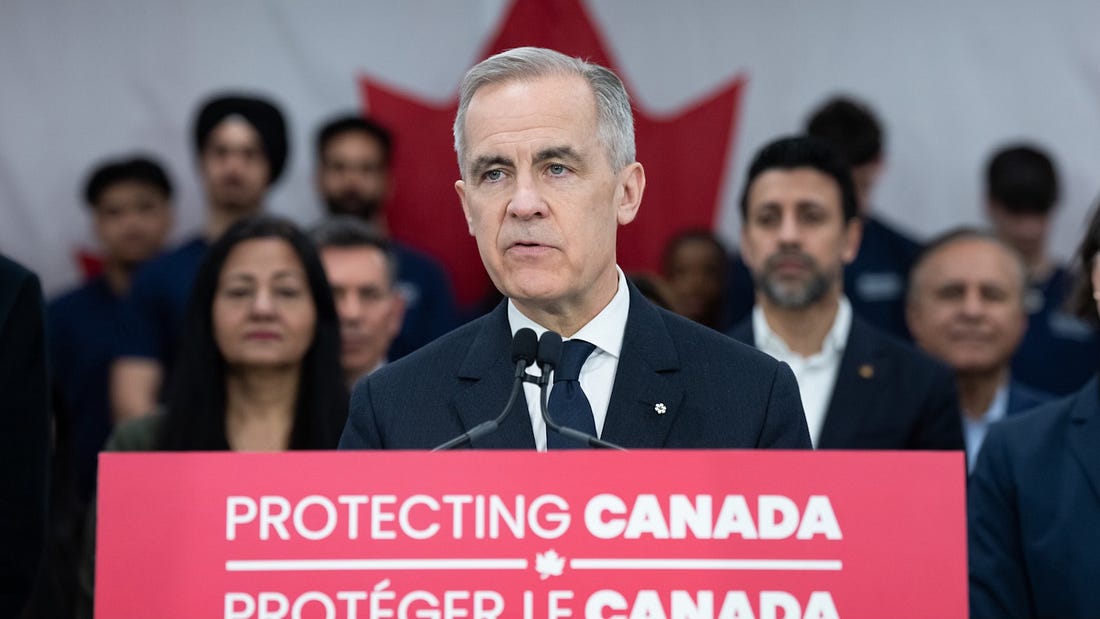With tech oligarchs embracing the extreme right, we need an honest account of what they’re up to more than ever — and that’s what Disconnect is here to provide. But I can’t provide that critical perspective without your support. If you can, become a paid subscriber. You’ll be supporting independent journalism, and getting even more great analysis along with it. Canada’s tech executives aren’t scared of Mark CarneyThey bet on the Conservatives, but the Liberals will give them much of what they want anywayIn April 2024, Justin Trudeau’s Liberal government was trying to claw back public support as an election grew closer. The annual budget provided an opportunity for a reset — not just of the government’s agenda, but of the narrative it was selling to the public. Budget 2024 promoted a suite of measures that were supposed to increase home construction, lower cost of living, and strengthen the social safety net. But Trudeau’s promise to build a more equitable economy found himself off side with an increasingly powerful and influential group of Canadian executives. As part of the government’s effort to increase tax fairness, the Liberals were planning to increase the capital gains inclusion rate. In practice, that meant for capitals gains above $250,000, individuals would need to pay tax on 66% of the gain they realized, instead of the existing rate of 50%. To be clear, that doesn’t mean they’d be taxed at 66%, but rather that two-thirds of the gain would be considered taxable income. The change was estimated to affect only 0.13% of the wealthiest Canadians, but the government didn’t seem to have planned for how influential the richest people in the country can be — and who makes up their ranks. The conservative embraceLike Silicon Valley billionaires had turned against the Democratic Party, executives in Canada’s tech industry had turned on Trudeau’s government since the early “sunny ways” of his first few years in office. Once the plan to increase taxes on capital gains was announced, that disagreement surged into the open. Shopify president Harley Finkelstein called it ”divisive and political” and said it amounted to “a tax on innovation and risk taking.” CEO Tobi Lütke agreed, claiming the government would “leave no stone unturned” to deter innovation, while tech lobby groups like the Council of Canadian Innovators started vocally opposing it on behalf of its members. Canada’s tech executives began more openly backing the Conservative Party and its leader Pierre Poilievre as he commanded a strong lead in opinion polls and seemed poised to become the next prime minister. As Trump returned to office, they launched groups called Build Canada and Canada Spends, which were designed to promote a right-wing policy agenda and a DOGE-like effort to gut the federal government. But as they were realigning, so was the Canadian public. On January 6, Trudeau resigned as leader of the Liberal Party, pending the selection of his replacement. By March 9, former central banker Mark Carney was chosen as the new leader and promptly sworn in as prime minister, only further propelling a Trump-fuelled reversal in public opinion that has him poised to form government following the vote on April 28. One might expect that would be terrible news for Canada’s radicalized tech executives. After openly feuding with the Trudeau government and embracing the Conservative Party, they should have few friends left within Liberal ranks. But in recent weeks, their aggressive rhetoric has been toned down — not just because Poilievre doesn’t have a chance in hell of becoming prime minister. Luckily for them, Carney has already proven he wants to be an ally. A friend to the tech industryCarney is fundamentally different than his predecessor. There’s no question he’s a competent leader, but he’s also positioning himself as being much more friendly to business, pulling from his history. He’s spent time at Goldman Sachs, headed the central banks of Canada and England during historic crises, and held posts at the United Nations and Brookfield Asset Management. Those are the more common details provided about his resume, but there’s more. Carney served on the board of Stripe, a major financial technology company, for nearly four years, and was reportedly interviewed to become president of Shopify in 2020, ultimately choosing to go to Brookfield instead. Notably, Shopify’s leaders are the most prominent right-wing tech executives in Canada and the company has long defended merchants using its platform to sell Nazi memorabilia and hate speech merchandise under the guise of free speech. In the short period after becoming prime minister but before kicking off the election, Carney showed he remained aligned with Canada’s tech industry. One of his first actions was to kill the increase to the capital gains inclusion rate. He has also consistently championed the need for Canada to embrace artificial intelligence, including deploying it in the federal public service to make government more “efficient” and reduce public spending. Released near the end of the campaign, the Liberal Party platform placed a further emphasis on Carney’s AI strategy. On top of billions of dollars headed in the industry’s direction, it calls to lessen “red tape” so Canada can be “the best place in the world to build data centres,” while proposing a tax credit to encourage small and medium-sized businesses to “leverage AI to boost their bottom lines.” His intention to proceed with a review of the corporate tax system is surely also music to the ears of Canada’s tech executives. Given Trump’s comments about Canada becoming the 51st state, sovereignty has been a central feature of the election campaign. Carney has explicitly linked cybersecurity capabilities and artificial intelligence to the defence of Canadian sovereignty, and the effort of tech executives to reframe their demands through the lens of “economic sovereignty” to align with the public mood and political rhetoric is already producing outcomes. On April 11, the Council of Canadian Innovators released an open letter signed by more than 150 domestic tech CEOs. It made a strong pitch for the government to invest more in the local tech industry, in part by reforming its procurement strategy to Buy Canadian — specifically, from the businesses of those who’d signed the letter. The group charged there were two kinds of leaders: those embracing “bold industrial strategy, procurement reform, domestic capacity building, and economic sovereignty” or “clinging to outdated thinking that says prosperity will come from subsidizing foreign companies.” The Liberal platform already had commitments along those lines. But not long after, Carney announced cloud computing contracts would prioritize Canadian providers if voters gave him a mandate to govern. The previous shortlist for a forthcoming major 25-year contract was made up of just four companies: Amazon, Microsoft, Google, and Oracle. But now that’s poised to change. It’s just one indication of how lucrative — and friendly — a Carney government could be for Canada’s tech industry. headlineSince the election began, right-wing groups have seized on some aspects of Carney’s history to try to score partisan political points. They pointed to his board position with Stripe to suggest he’s responsible for payment processing fees that have angered some small businesses. Another line of attack has sought to stoke the anger of cryptocurrency fanatics over Carney’s opposition to the scam-laden technology, while leaving the door open to central bank digital currencies. But those arguments are distractions from the more important story: Carney has a long relationship and fondness for the modern tech industry. Since positioning himself as a Liberal leadership contender, he’s continually been a booster for AI and data centre construction, and as prime minister he quickly sought to mend fences by killing the capital gains tax hike and adopting policies meant to appeal to the industry. For much of the past year, if not longer, the focus of analysis on the tech industry’s politics has often focused on the alignment of its powerful figures with the extreme right and the dire consequences that have followed from that alliance. The Conservatives appear to be headed for inevitable defeat, but the tech industry still has ways to ensure parts of its policy agenda are adopted anyway. Across the pond, the British Labour Party under Keir Starmer has similarly embraced the hype around AI and begun granting the tech industry whatever policy changes it demands in exchange for dubious investments. It’s reforming national copyright law to provide greater protection for AI companies training on copyrighted work without permission, rolling out AI to make government more “efficient,” and easing rules around data centre construction, regardless of the consequences of those decisions. As Carney appears set to form government, Canadians must be on guard for the consequences of his alignment with domestic tech CEOs. They may not wield as much power as the billionaires of Silicon Valley, but that does not mean Canada will be immune from short-sighted policy decisions justified in the name of efficiency and innovation that enrich tech executives, while justifying government austerity. Despite betting on the losing horse, Canada’s “innovators” are poised to win the jackpot regardless. You're currently a free subscriber to Disconnect. For the full experience, upgrade your subscription. |



